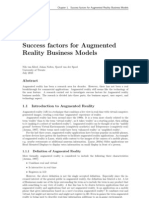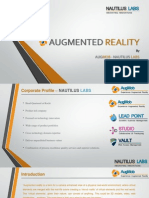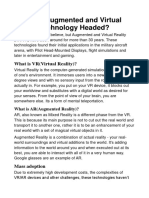0% found this document useful (0 votes)
124 views11 pagesAugmented Reality Insights 2020
This document provides a comprehensive guide to augmented reality (AR) in 2020. It discusses what AR is, how it has evolved from early prototypes in 1968 to widespread applications today. Examples are given of how AR is being used in industries like healthcare, education, and retail to improve performance. The future of AR is also explored, with predictions that the AR market will be worth $198 billion by 2025 and will generate over 23 million jobs, reaping vast economic benefits.
Uploaded by
Rathna KumarCopyright
© © All Rights Reserved
We take content rights seriously. If you suspect this is your content, claim it here.
Available Formats
Download as PDF, TXT or read online on Scribd
0% found this document useful (0 votes)
124 views11 pagesAugmented Reality Insights 2020
This document provides a comprehensive guide to augmented reality (AR) in 2020. It discusses what AR is, how it has evolved from early prototypes in 1968 to widespread applications today. Examples are given of how AR is being used in industries like healthcare, education, and retail to improve performance. The future of AR is also explored, with predictions that the AR market will be worth $198 billion by 2025 and will generate over 23 million jobs, reaping vast economic benefits.
Uploaded by
Rathna KumarCopyright
© © All Rights Reserved
We take content rights seriously. If you suspect this is your content, claim it here.
Available Formats
Download as PDF, TXT or read online on Scribd
/ 11


























































































